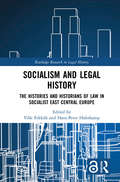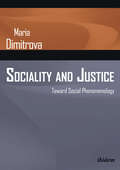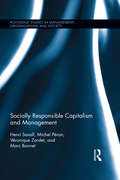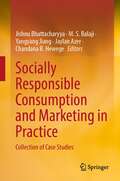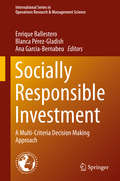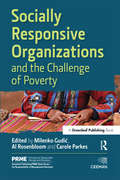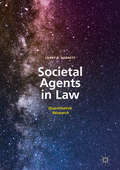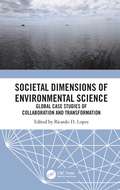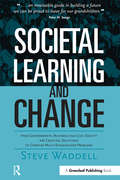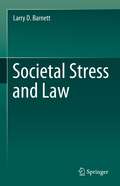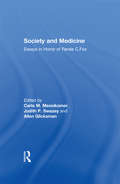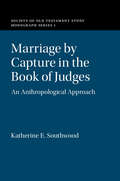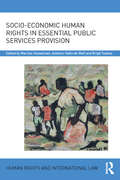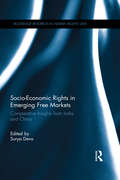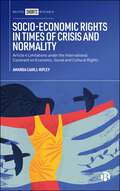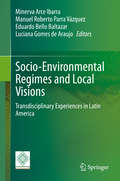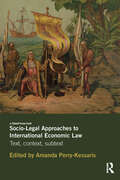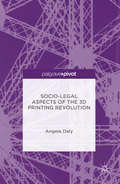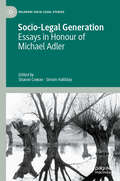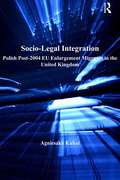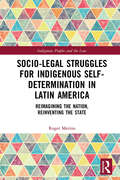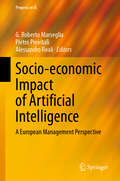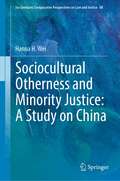- Table View
- List View
Socialism and Legal History: The Histories and Historians of Law in Socialist East Central Europe (Routledge Research in Legal History)
by Ville Erkkilä Hans-Peter HaferkampThis book focuses on the way in which legal historians and legal scientists used the past to legitimize, challenge, explain and familiarize the socialist legal orders, which were backed by dictatorial governments. The volume studies legal historians and legal histories written in Eastern European countries during the socialist era after the Second World War. The book investigates whether there was a unified form of socialist legal historiography, and if so, what can be said of its common features. The individual chapters of this volume concentrate on the regimes that situate between the Russian, and later Soviet, legal culture and the area covered by the German Civil Code. Hence, the geographical focus of the book is on East Germany, Russia, the Baltic states, Poland and Hungary. The approach is transnational, focusing on the interaction and intertwinement of the then hegemonic communist ideology and the ideas of law and justice, as they appeared in the writings of legal historians of the socialist legal orders. Such an angle enables concentration on the dynamics between politics and law as well as identities and legal history. Studying the socialist interpretations of legal history reveals the ways in which the 20th century legal scholars, situated between legal renewal and political guidance gave legitimacy to, struggled to come to terms with, and sketched the future of the socialist legal orders. The book will be a valuable resource for academics and researchers working in the areas of Legal History, Jurisprudence and Philosophy of Law and European Studies.
Socialist Law in Socialist East Asia
by John Gillespie Pip Nicholson Hualing Fu William Edmund PartlettSince China's reform and opening up started in 1978 and Vietnam's Doi Moi reforms were initiated in 1986, these two East Asian economies have adopted capitalistic models of development while retaining and reforming their socialist legal systems along the way. Tracking the trajectory of socialist laws and their legacy, this book offers a unique comparison of laws and institutional designs in China and Vietnam. Leading scholars from China, Vietnam, Australia and the United States analyze the history, development and impact of socialist law reforms in these two continuing socialist states. Readers are offered a varied insight into the complex quality and unique features of socialist law and why it should be taken seriously. This is a fresh theoretical approach to, and internal critique of, socialist laws which demonstrates how socialist law in China and Vietnam may shape the future of global legal development among developing countries.
Sociality and Justice: Toward Social Phenomenology
by Maria DimitrovaBuilding on the work of Emmanuel Levinas, this groundbreaking book puts the phenomenological paradigm into a new perspective. Overcoming the focus on self-reflection of the thinking subject and instead arguing for the importance of sociality as responsibility for the Other, this new approach is based on inter-subjectivity and introduces a social dimension in phenomenology. This also allows for a different interpretation of the notion of justice, which in this context sits in the space between the one, the other, and the third before settling into any relation to the law. In the vast area inhabited by more or less distant others, moral responsibility is implemented through the establishment and maintenance of just institutions.
Socially Responsible Capitalism and Management (Routledge Studies in Management, Organizations and Society)
by Marc Bonnet Henri Savall Michel Péron Véronique ZardetIn the current crisis context, capitalism is questioned by its detractors or defended by its partisans. The concept of Socially Responsible Capitalism (SRC) is based on the entrepreneurial spirit. It encourages exemplary behaviors, such as effective, efficient and ethical behaviors, by stimulating social responsibility of companies and organizations. This is combined with the development of economic empowerment and legitimate efforts of each citizen-actor. Socially Responsible Capitalism and Management does not confuse financial capitalism and entrepreneurial capitalism. The first one improves the creation of artificial value which leads to financial bubbles that periodically burst and bankrupt the real economy. Quite the reverse, entrepreneurial capitalism creates both solid economic value and employment. This is justified by the production of goods and services that meet legitimate needs of consumer-citizens. This book shows that by putting Human Beings at the heart of action enables producing sustainable economic value, and anthropological values which are inseparable. The innovative aspect of this book lies in its analysis starting from the macro-economic level to the individual one, by presenting a detailed analysis of the micro-economic level of companies within its managerial issues. Socially Responsible Capitalism and Management is dedicated to present the different aspects of SRC for the Society, companies and organizations and also individual actors, as citizens, producers and consumers.
Socially Responsible Consumption and Marketing in Practice: Collection of Case Studies
by Jishnu Bhattacharyya M. S. Balaji Yangyang Jiang Jaylan Azer Chandana R. HewegeThe book provides an overview of socially responsible consumption and marketing, as well as a collection of teaching cases that discuss and emphasize how 21st-century organizations, both for-profit and non-profit, are addressing socially responsible consumers and meeting their changing needs while remaining profitable. Consumers, governments, academics, and practitioners are becoming more interested in promoting positive social changes through consumption. As a result, this book aims to understand the practice of marketing in bringing about positive social change through real-life case studies. Consumption by socially responsible consumers who care about the social good is unique, not only because of its inter-disciplinary and substantive subject matter but also because it presents challenges and pushes organizations to make significant changes in the ways they have been accomplishing organizational activities in the twenty-first century, from procurement to production to sales and services. The book goes beyond individual consumers and their lifestyles to promote the scope of discussing marketing strategies. It seeks to comprehend how people consume and how socially responsible consumption is conceived. The case studies present and pursue integrated solutions for more sustainable consumption. This is a must-read for marketers who want to reach out to socially responsible consumers.
Socially Responsible Investment
by Enrique Ballestero Blanca Pérez-Gladish Ana Garcia-BernabeuThis book integrates socially responsible investment into modern portfolio theory from a multi-criteria perspective. Socially responsible investment is a "new deal" championed by the institutional investment and bank sectors, agents that influence mutual funds and other collective investment schemes and which fear that financial strategies without ethical constraints can harm sustainable growth and prosperity. The book shows how to combine financial criteria such as profitability and risk with non-financial criteria such as the protection of the ecosystem, responsible consumption of energy, and healthcare campaigns. The book's first part presents critical issues in ethical investment, while the second explains in detail the application of goal programming techniques for SRI funds, illustrating their use in actual cases. Part three demonstrates how compromise programming can be applied in the contexts of portfolio selection and risk management. Finally, in its fourth part the book examines the application of other decision-making support methods like the Analytic Hierarchy Process (AHP) framework, the Reference Point Method, and soft computing techniques for portfolio selection.
Socially Responsive Organizations & the Challenge of Poverty (The Principles for Responsible Management Education Series)
by Milenko Gudić Al Rosenbloom Carole ParkesThis book provides a combination of case studies and current action research describing how businesses and civil society organizations are working to alleviate poverty in local and global communities. It intends to provide conceptual and research rationales for why management education and management institutions must address the issue of poverty. The book responds to one of the major findings from the research of the PRME Working Group on Poverty that the topic of poverty still lacks a strong business case for management educators and program/institutional administrators. The distinctive features of this book are that it: (1) includes examples of small and medium-sized (SME) businesses; (2) deals with the issue of poverty as a human rights violation; (3) explores the issue of absolute versus relative poverty; (4) deals with leadership challenges in organizations committed to poverty alleviation; and (5) discusses the issues in terms of management education’s responsibility for setting new management, research institutional and intellectual agendas. The first of two books to be produced by the PRME Working Group on Poverty, Socially Responsive Organizations and The Challenge of Poverty aims to provide both researchers and practitioners with the most wide-ranging coverage yet published on how business can be a positive force in alleviating poverty and how management education needs to adapt to this increasingly crucial prerogative.
Societal Agents in Law: Quantitative Research
by Larry D. BarnettIn this two-volume set, Larry D. Barnett delves into the macrosociological sources of law concerned with society-important social activities in a structurally complex, democratically governed nation. Barnett explores why, when, and where particular proscriptions and prescriptions of law on key social activities arise, persist, and change. The first volume, Societal Agents in Law: A Macrosociological Approach, puts relevant doctrines of law into a macrosociological framework, uses the findings of quantitative research to formulate theorems that identify the impact of several society-level agents on doctrines of law, and takes the reader through a number of case analyses. The second volume, Societal Agents in Law: Quantitative Research, reports original multivariate statistical studies of sociological determinants of law on specific types of key social activities. Taken together, the two volumes offer an alternative to the almost-total monopoly of theory and descriptive scholarship in the macrosociology of law, comparative law, and history of law, and underscore the value of a mixed empirical/theoretical approach.
Societal Dimensions of Environmental Science: Global Case Studies of Collaboration and Transformation
by Ricardo D. LopezSocietal Dimensions of Environmental Science: Global Case Studies of Collaboration and Transformation, brings together several key examples of the successes and the challenges that exist for environmental stakeholders trying to strike a balance between science and the societal implications of the issues involved. This book provides important methods and approaches necessary for informed decision making and a better understanding of the common threads of learning, collaboration, negotiation, and compromise. It also explains that concepts and skills needed to better understand how specific project goals can be best achieved in the rapidly changing field of environmental management, by providing practical situations and solutions, across a global landscape. This book provides anyone who works in a community setting with the necessary tools and strategies for solving environmental problems and achieving the goals of an environmental project of any type and specifically addresses the topic of how to synthesize community engagement and the environmental science. It describes current environmental issues and lessons learned of what works and what doesn’t work in real situations, and why. It also highlights key examples, which can be used by both management practitioners and research scientists in their specific circumstances. Showcasing a unique compilation of the diverse and specific examples from societies in Asia, Oceania, North America, and the Middle East, with an equally diverse array of authorship, this book serves all policy makers, scientists, organizers, and community members that desire to build better group dynamics for addressing environmental issues.
Societal Learning and Change: How Governments, Business and Civil Society are Creating Solutions to Complex Multi-Stakeholder Problems
by Steve WaddellConstructing roads in Madagascar; forestry along Canada's Pacific Coast; water and sanitation projects in South Africa; community banking in the United States; constructing a new global system for corporate reporting. These all have something in common. They provide great illustrations of the types of profound and wise changes needed in the way we run our affairs if we are to respond to the scale of environmental and social challenges and opportunities facing us. They are examples of "societal learning and change". Today, this phenomenon is occurring across industries as diverse as resources extraction, infrastructure development, agriculture and information technology at the local, national, regional and global levels. Its essence involves the ability to create rich relationships that bridge large differences. This book describes this phenomenon for practitioners to help them address issues and develop opportunities more effectively. Building on the traditions of individual and organizational learning, this book suggests that our challenge is to create learning societies and processes. This involves both change in ourselves as individuals, but also change in the way the three key systems that make up our societies – the political system (government), economic system (business) and social system (civil society) – function by creating more robust interactions that respond to human and environmental imperatives rather than organizational ones. Societal Learning and Change presents a meta-framework that covers diverse approaches, including corporate citizenship, social responsibility, community development, private-public partnerships, inter-sectoral collaboration and sustainability strategies. It makes sense of all of these by emphasising that they all share the need to change relationships at the societal level and explaining how to do this from a systems perspective. The book helps overcome the conundrum where individual organisations are unsuccessfully trying to achieve big change with their stakeholders. Rather than stakeholder management with an organization-centric viewpoint, this book describes the importance of taking a stakeholder engagement and issue/opportunity-centric strategy. Wherever you are, you can make a contribution to shifting the paradigm through a societal learning and change strategy. The critical contribution is creating new relationships between people and organizations that traditionally would not interact but in fact have common interests. When these relationships become meaningful by addressing a problem or developing an opportunity, people begin to learn about each other and develop mutual appreciation and understanding. Often this process is complicated and confusing. People do not use words in the same way even if they speak the same formal language; they do not learn or perceive the world the same way although they may share a common culture; their organizations have diverse goals, resources and weaknesses that make working together problematic. However, it is these very differences that are the source of the value of working together. Societal Learning and Change aims to make it easier to solve differences in order to work together successfully; it does this by identifying some of the differences as sources of tension and opportunity and describing the development processes of building relationships that can produce mutually rewarding innovation that is unimaginable when the relationship begins. This is an extremely optimistic book at a time of great pessimism about the huge forces of globalization and corporate power that seem to be overwhelming us. It will be essential reading for students and practitioners in the fields of organizational learning, sustainability, poverty, international development and stakeholder relations.
Societal Stress and Law
by Larry D. BarnettSocietal Stress and Law draws attention to the social side effects of law by developing the sociological concept of society-level stress, a corollary of the concept of individual-level stress in the biological sciences. To encourage interest in societal stress, the book looks at (1) instances of law adopted by American states that the U.S. Supreme Court held unconstitutional and (2) actions by American states with regard to a proposal to amend the federal Constitution. The Court rulings and the proposed constitutional amendment were capable of producing societal stress because they were seen by a sizeable segment of the U.S. public as being incompatible with significant American traditions. In original studies that apply logistic regression to state-level statistical data, the book identifies sociological variables that predict state differences in the adoption of this law and state differences in actions on the proposed constitutional amendment. Because these variables represent societal agents that affected whether a state experienced social stress from the rulings and proposal, the book blends theory with empirical research and illustrates how each can support the other in law-focused scholarship.
Society and Medicine: Essays in Honor of Renee C.Fox
by Judith P. Swazey"The essays in this volume pay tribute to the achievements of RenÚe C. Fox in the fields of medicine and sociology. Many of the contributors are Fox's colleagues and former students from medicine, sociology, nursing, and bioethics. The title--Society and Medicine--reflects the leitmotif in Fox's work: her studies of and teaching about the nature of medicine and medical research; the training and work of their practitioners; the interrelationships between medicine and the societies and cultures of which it is a part; and, above all, the moral and spiritual dimensions of the healing arts."
Society for Old Testament Study: Marriage by Capture in the Book of Judges
by Southwood Katherine E.In this book, Katherine E. Southwood offers a new approach to interpreting Judges 21. Breaking away from traditional interpretations of kingship, feminism, or comparisons with Greek or Roman mythology, she explores the concepts of marriage, ethnicity, rape, and power as means of ethnic preservation and exclusion. She also exposes the many reasons why marriage by capture occurred during the post-exilic period. Judges 21 served as a warning against compromise- submission to superficial unity between the Israelites and the Benjaminites. Any such unity would result in drastic changes in the character, culture, and values of the ethnic group 'Israel'. The chapter encouraged post-exilic audiences to socially construct those categorised as 'Benjaminites' as foreigners who do not belong within the group, thereby silencing doubts about the merits of unity.
Society, Culture and the Auditory Imagination in Modern France
by Ingrid SykesThis book examines the striking way in which medical and scientific work on hearing in eighteenth and nineteenth-century France helped to shape modern French society and culture. Contemporary scientists and anatomists had to come to terms with a new kind of transformative physiology within the material site of the human ear, one that had the potential to construct space and place in the most powerful way imaginable. Auditory medical specialists found themselves at the center of pivotal philosophical, political and social debates on how the individual citizen might use their ears to reach out to those around them constructing broader, protective models of social reform. Sykes makes the case that of all the senses hearing offered the greatest resources for remodelling the idea of the universal human condition within the modern French historical setting.
Socio-Economic Human Rights in Essential Public Services Provision (Human Rights and International Law)
by Brigit Toebes Marlies Hesselman Antenor Hallo de WolfThere is a clear overlap between securing socio-economic human rights for all persons and arranging adequate access to essential public services across society. Both are necessary to realise thriving, inclusive societies, with adequate living standards for all, based on human dignity. This edited volume brings together the two topics for the first time. In particular, it identifies the common challenges for essential public services provision and socio-economic human rights realisation, and it explores how socio-economic rights law can be harnessed to reinforce better access to services. An important aim of this book is to understand how international socio-economic human rights law and guideposts can be used and strengthened to improve access to services, and assess socio-economic legal and policy decisions. The volume includes contributions from different continents, on a range of different services, and engages with the realities of different regulatory settings. After an introduction that sets out the most important challenges for universal access to services – including sufficient resources mobilisation, private actor involvement and regulation, or the need for improved checks and balances – the book goes on to discuss current issues in services provision and socio-economic rights, as well as explores the place and role of private business actors in the provision of services. In particular, it assesses how the responsibility and accountability of such actors for human rights can be improved . The final part of the book narrows in on the under-explored human rights concepts of ‘participation’ and ‘accountability’, as essential prerequisites for better ‘checks and balances’. Overall, this volume presents a unique and powerful illustration of how socio-economic human rights law supports improved access to essential public services for all.
Socio-Economic Rights in Emerging Free Markets: Comparative Insights from India and China (Routledge Research in Human Rights Law)
by Surya DevaIn the last decade or so, China and India have emerged on the global stage as two powerful free market economies. The tremendous economic growth in China and India has meant that they have been able to lift millions of people out of the poverty trap. This growth has not, however, been without problems. Apart from worrying levels of environmental pollution, a significant number of people are still struggling to live a decent life as they do not have adequate access to basic needs such as food, health services, education, water, and housing. The traditional old age support mechanism is collapsing amidst push for urbanisation and the practice of nuclear families, while the alternative social security system has not been put in place. Both China and India stress the importance of socio-economic rights, have ratified the International Covenant on Economic, Social and Cultural Rights and have in place a strong legal framework for the realisation of such rights. The constitutions of China and India accord significant importance to socio-economic rights and the both countries have numerous laws, regulations and policies that seek to implement various socio-economic rights. This book investigates how the gradual adoption of free market ideology has impacted on the realisation of socio-economic rights in both India and China and how the constitutional and legal frameworks have made necessary adjustments. Chapters in this volume, which are written by academics of international standing, explore how these two countries have tried to overcome certain common governance challenges in realising socio-economic rights. The role played by courts in India and China in the protection and realisation of socio-economic rights is considered along with the use and limitations of public interest litigation in achieving these rights. Finally, the effectiveness of measures in realising socio-economic rights are evaluated in relation to specific rights such as the rights to food, health, education, social security, and gender equality.
Socio-Economic Rights in Times of Crisis and Normality: Article 4 Limitations under the International Covenant on Economic, Social and Cultural Rights
by Amanda Cahill-RipleyThis groundbreaking book explores the under examined nature and scope of Article 4 of the International Covenant on Economic, Social and Cultural Rights (ICESCR), which governs permissible restrictions on these rights. Challenging the assumption that such limitations apply only during crises, it analyses their application in diverse contexts, from financial crises and public health emergencies, to situations of armed conflict. Through doctrinal and empirical analysis, the book offers a comprehensive examination of UN and state practice, highlighting the need for clarity, specificity and authenticity. It provides recommendations for developing a legal framework that promotes the optimal protection of ESCRs during normality and crisis alike.
Socio-Environmental Regimes and Local Visions: Transdisciplinary Experiences in Latin America
by Minerva Arce Ibarra Manuel Roberto Parra Vázquez Eduardo Bello Baltazar Luciana Gomes de AraujoThis book presents oral histories, collective dialogues, and analyses of rural and indigenous livelihoods facing global socio-environmental regime change in Latin America (LA). Since the late twentieth century, rural and indigenous producers in LA, including agriculturists, coffee-growers, as well as small-scale farmers/fishers, and others, have had to resist, cope with, or adapt to a range of neoliberal socio-environmental regimes that impact their territories and associated resources, including water, production systems and ultimately their cultural traditions. In response, rural producers are using local visions and innovation niches to decide what, when, and how to resist, cope with uncertainty, and still be successful in using their customary laws to retain their land rights and livelihoods.This book presents a range of ethnically diverse case studies from LA, which addresses socio-environmental, educational, and law regimes’ effects using transdisciplinary research approaches in rural, traditional and indigenous production systems. Based on both, the results and insights gained into how producers are resisting and adapting to these regimes, as well as decades of research carried out in LA rural territories by the participating authors, the book puts forward a baseline for devising new public policies that are better suited to the real challenges of livelihoods, poverty, and environmental degradation in LA. These recommendations are rooted in post-development thinking; they promote territorial public policy with social inclusion and a human’s rights approach. The book draws on over 20 years of research carried out by LA’s academics and their undergraduate and graduate students who have addressed collaborative work, participatory research, and transdisciplinary approaches with rural commons and communities in LA. It features 19 case studies, with contributions from Argentina, Bolivia, Brazil, Colombia, Cuba, Honduras, and Mexico.
Socio-Legal Approaches to International Economic Law: Text, Context, Subtext
by Amanda Perry-KessarisThis collection explores the analytical, empirical and normative components that distinguish socio-legal approaches to international economic law both from each other, and from other approaches. It pays particular attention to the substantive focus (what) of socio-legal approaches, noting that they go beyond the text to consider context and, often, subtext. In the process of identifying the ‘what’ and the ‘how’ (analytical and empirical tools) of their own socio-legal approaches, contributors to this collection reveal why they or anyone else ought to bother--the many reasons ‘why’ it is important, for theory and for practice, to take a social legal approach to international economic law.
Socio-Legal Aspects of the 3D Printing Revolution
by Angela DalyAdditive manufacturing or '3D printing' has emerged into the mainstream in the last few years, with much hype about its revolutionary potential as the latest 'disruptive technology' to destroy existing business models, empower individuals and evade any kind of government control. This book examines the trajectory of 3D printing in practice and how it interacts with various areas of law, including intellectual property, product liability, gun laws, data privacy and fundamental/constitutional rights. A particular comparison is made between 3D printing and the Internet as this has been, legally-speaking, another 'disruptive technology' and also one on which 3D printing is partially dependent. This book is the first expert analysis of 3D printing from a legal perspective and provides a critical assessment of the extent to which existing legal regimes can be successfully applied to, and enforced vis-à-vis, 3D printing.
Socio-Legal Generation: Essays in Honour of Michael Adler (Palgrave Socio-Legal Studies)
by Simon Halliday Sharon CowanThis book honors the diverse and path-breaking work of Michael Adler, a pioneer of socio-legal scholarship in the UK. The book brings together an international group of scholars—established and emerging researchers from across the globe—to develop key ideas generated by Adler’s scholarship. Building on his rich portfolio of creative work at the interface of law and social science, the book explores themes that continue to resonate in contemporary debates about how best to understand the relationship between justice, fairness, and the modern administrative state. Specifically, the book re-examines core issues which Adler, as a key figure of the first generation of UK socio-legal scholars, explored, including: the relationship between official discretion and the rule of law; the justice of internal administrative processes; the importance of a ‘bottom up’ perspective on justice; power and accountability in the prison sector; access to justice for social welfare claimants; and the promise of viewing law through the lens of social science.
Socio-Legal Integration: Polish Post-2004 EU Enlargement Migrants in the United Kingdom (Cultural Diversity and Law)
by Agnieszka KubalThis book examines how contemporary migrants form and transform their involvement with the law in their host countries and which factors influence this relationship. It suggests a more comprehensive insight into the socio-legal integration of migrants by analysing the interplay between the new legal environment and migrants' existing culturally-derived values, attitudes, behaviour and social expectations towards law and law enforcement. Acknowledging the superdiversity of migration as a global issue, the book uses the case study of Polish post-2004 EU Enlargement migrants to examine values and attitudes to the rules that govern their work and residence in the UK and to the legal system in general. With wider international relevance than just Poland and the UK, this book makes a case for the meaningful employment of legal culture in socio-legal integration research and suggests far-reaching consequences for host countries and their immigrant communities.
Socio-Legal Struggles for Indigenous Self-Determination in Latin America: Reimagining the Nation, Reinventing the State (Indigenous Peoples and the Law)
by Roger MerinoThis book is an interdisciplinary study of struggles for indigenous self-determination and the recognition of indigenous’ territorial rights in Latin America. Studies of indigenous peoples’ opposition to extractive industries have tended to focus on its economic, political or social aspects, as if these were discrete dimensions of the conflict. In contrast, this book offers a comprehensive and interdisciplinary understanding of the tensions between indigenous peoples’ territorial rights and the governance of extractive industries and related state developmental policies. Analysing the contentious process pushed by indigenous peoples for implementing pluri-nationality against extractive projects and pro-extractive policies, the book compares the struggle for territorial rights in Bolivia, Ecuador and Peru. Centrally, it argues that indigenous territorial defenses against the extractive industries articulate a politics of self-determination that challenges coloniality as the foundation of the nation-state. The resource governance of the nation-state assumes that indigenous peoples must be integrated or assimilated within multicultural arrangements as ethnic minorities with proprietary entitlements, so they can participate in the benefits of development. As the struggle for indigenous self-determination in Latin America maintains that indigenous peoples must not be considered as ethnic communities with property rights, but as nations with territorial rights, this book argues that it offers a radical re-imagination of politics, development, and constitutional arrangements. Drawing on detailed case studies, this book’s multidisciplinary account of indigenous movements in Latin America will appeal to those with relevant interests in politics, law, sociology and development studies.
Socio-economic Impact of Artificial Intelligence: A European Management Perspective (Progress in IS)
by Pietro Previtali G. Roberto Marseglia Alessandro RealiThis edited volume discusses ethical issues raised by the use of artificial intelligence (AI) in business. Written by academics and practitioners across Europe, this volume provides a regional management perspective on the consequences of AI, including potential effects on the business models of companies, strategic considerations regarding the construction of data-literate companies and workforces, and the limits and opportunities of proposed EU regulations. Providing a forum to hypothesise solutions for accelerating technology adoption while guaranteeing human dignity, this book will be valuable for researchers and students interested in management, AI, fintech, information systems, and sustainable business as well as managers and practitioners navigating the challenges of a data-driven future.
Sociocultural Otherness and Minority Justice: A Study on China (Ius Gentium: Comparative Perspectives on Law and Justice #88)
by Hanna H. WeiThis book draws attention to the nonlegal, sociocultural aspects of justice for minorities in China. The primary objectives are threefold. The first is to present a tentative analysis of the lived realities of being ‘the other’ in China, with the aim of presenting a critical picture of the complex national context and identifying main concerns and key challenges. Six topics are covered - gender roles, health, class, intimacy, ethnicity and religion, and expression. The second objective is to explore the interaction between a wide range of factors and myriad systems that enable or hinder protection and justice for these groups, be they historical, political, social, or cultural, hoping to open up a rich domain of inquiry for those interested in to what extent and in what ways otherness may or may not survive in China. The third objective is to bring attention to new trends and developments, some are easily identifiable whereas others are less detectable, some are interrelated while others are relatively isolated, some are straightforward and others remain easily misinterpreted.
